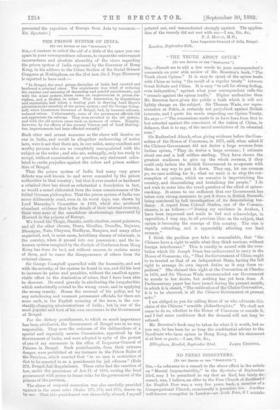"THE TRUTH ABOUT OPIUM."
[To TER EDITOR OF max " SPEORLT011."] Sin,—Permit me to add a few words to your correspondent's comments on your able review of Mr. Brereton's book, "The Truth about Opium." It is easy to speak of the opium trade with China as being "the result of a regular treaty" between Great Britain and China. It is easy "to call for strong feeling, even indignation," against what your correspondent calla the "crusade against the opium traffic." Higher authorities than Mr. Brereton have given the public a faith which it will not lightly change on the subject. Sir Thomas Wade, our repre- sentative at Pekin, is certainly not prejudiced against British interests, and I quote his words respecting our Opium Treaty,. He says :—" The concessions made to us have been from first to last extorted against the conscience of the nation of China, in defiance, that is to say, of the moral convictions of its educated men."
Sir Rutherford Alcock, when giving evidence before the Com- mittee of the House of Commons, in 1871, said, when asked if the Chinese Government did not derive a large revenue from Indian opium, "They do derive a large revenue ; I estimate about one and a half million sterling. They have shown the greatest readiness to give up the whole revenue, if they could only induce the British Government to co-operate with them in any way to put it down. They say, let our revenue. go, we care nothing for it ; what we want is to stop the con- sumption of opium, which we conceive is impoverishing the' country, and demoralising and brutalising the people!' I do not wish to enter into the vexed question of the effect of opium- smoking. It seems to me sufficient that our Government has taken very strong measures to put it down in British Burmah, being convinced by full investigation of its demoralising ten- &may. A report from Colonel Staden, one of the Commis- sioners, is as follows :•—•" During my residence in Arakan, I have been impressed and made to feel and acknowledge, in opposition, I may say, to all previous ideas on the subject, that opium is becoming the scourge of this country. The vice is rapidly extending, and is appreciably affecting our land. revenue."
I think the position you take is unassailable, that "the- Chinese have a right to settle what they think noxious, without foreign interference." This is exactly in accord with the reso- lution which Sir Joseph Pease has endeavoured to carry in the House of Commons, vis„ "That the Government of China ought to be treated as that of an independent State, having the full right to arrange its own import duties as it may deem ex- pedient." She claimed this right at the Convention at Cheefoo• in 1876, and Sir Thomas Wade recommended our Government to accede to her desire, but nothing has yet been done. A Parliamentary paper has been issued during the present month, in which it is stated, "The ratification of the Chefoo Convention it is to be observed, is all the Chinese Government at present asks."
I am obliged to you for calling those of us who advocate this claim of the Chinese " sensible philanthropists." We shall not cease to do so, whether in the House of Commons or outside it„ and I feel some confidence that the demand will not long be. refused.
Mr. Brereton's book may be taken for what it is worth, but as you say, he has been for so long the confidential adviser to the Syndicate who farm opium in Hong Kong, that his statement- is at best ex parte.—I am, Sir, &e., Ellingham, Kendal, September 23rd, JAMES CROPPER,


































 Previous page
Previous page